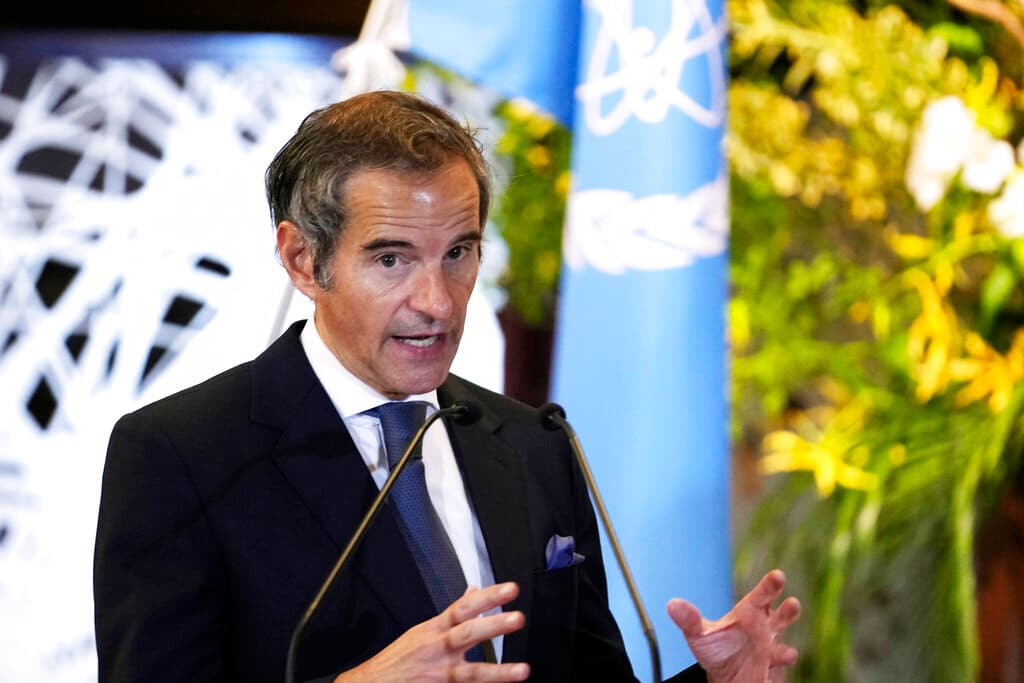Iran’s ‘Galloping’ Nuclear Program Getting Away From UN Watchdog, Agency Warns
Says Rafael Grossi: ‘It is going to be very difficult for me to reconstruct the puzzle.’

The United Nation atomic watchdog’s chief, Rafael Grossi, doubts that his agency would be able to resume effective inspection of Iran’s “galloping” nuclear program even if — and it’s a big if — Tehran decided to renew the 2015 nuclear deal.
Last month the board of directors of the International Atomic Energy Agency opted to censure Iran for blocking inspections of its nuclear program. Tehran retaliated by shutting down the Vienna-based agency’s 28 monitoring cameras and other inspection devices installed at Iranian facilities. Now inspection will be difficult to renew successfully even if the equipment is restored, Mr. Grossi says.
“The bottom line is that for almost five weeks I have had very limited visibility, with a nuclear program that is galloping ahead,” Mr. Grossi, an Argentine, told El Pais while on a trip to Spain. “And, therefore, if there is an agreement, it is going to be very difficult for me to reconstruct the puzzle of this whole period of forced blindness.”
While “not impossible,” Mr. Grossi added, resuming effective inspections “is going to require a very complex task and perhaps some specific agreements.”
Inspection invisibility significantly diminishes the inspectors’ ability to document progress in the Iranian program. “If we don’t know what’s there, how can we determine how much material to export, how many centrifuges to leave unused?” Mr. Grossi said.
His interview “should be a wakeup call to those who think Iran’s death by a thousand cuts to the monitoring and verification regime can be repaired if the JCPOA is restored tomorrow,” an Iran watcher at the Foundation for Defense of Democracies, Behnam Ben Taleblu, said. A renewed nuclear deal containing insufficient inspection would be a “kabuki theater, with Iran pulling the strings.”
Meanwhile the mullahs are not rushing to renew the 2015 deal anyway. “I don’t think the supreme leader of Iran wants to cut a deal,” the chief of MI6, Britain’s external intelligence agency, Richard Moore, told a security conference at Aspen, Colorado, this week.
One does not “need a security clearance to discern the fact that Iran at this point doesn’t seem to have made the political decisions” necessary “to achieve a mutual return to compliance with the JCPOA,” the state department spokesman, Ned Price, conceded as well.
Yet, President Biden clings to the idea that Iran “diplomacy” and a return to the 2015 deal are the best ways to assure that Iran does not become a nuclear power. A JCPOA renewal has been “within reach for quite some time now,” Mr. Price told state department reporters yesterday,
A renewed deal is much needed, he added, “to reapply those stringent limits on Iran’s nuclear program, to reimpose the most stringent verification and monitoring regime ever peacefully negotiated, and, in the case of Iran, to see to it that appropriate sanctions relief is applied if Iran once again curtails its nuclear activity.”
As Mr. Grossi made clear, successful monitoring would, at least, require new agreements. Iranian negotiators, however, are refusing to contemplate such steps. Instead, Tehran now seeks guarantees that another American president would not walk away from the deal, as President Trump did in 2018. “We do not want to be stung twice,” Tehran’s foreign minister, Hossein Amir-Abdollahian, said yesterday.
While amassing conditions they know no American president can agree to, the Iranians nevertheless are eager to extend negotiations. They “won’t want to end the talks either,” Mr. Moore of the MI6 told the Aspen conference.
Why would they? The Islamic Republic increasingly manages to evade American sanctions, including on its oil that it exports globally at a discounted price. According to a new report by United Against Nuclear Iran, Communist China is “keeping the Iranian regime in business through oil purchases that have totaled $22 billion” since Mr. Biden assumed office.
Beijing has helped Iran to “tread water and enabled it to go through this period” of American sanctions, UANI’s policy director, Jason Brodsky, told the Sun. As Washington relaxes enforcement, Iran is less eager than it has been to end the sanctions regime. By removing IAEA cameras, Iran is now “signaling to the world that they’re not interested in the renewal of the JCPOA,” Mr. Brodsky said.
As Britons and Americans raise similar doubts, they nevertheless offer no alternative to the JCPOA’s diplomacy-to-nowhere, and no other plan to keep nuclear weapons out of one of the world’s most dangerous regimes.
Yet, one guest at this week’s Aspen security forum did chart a viable course to end Iran’s nuclear ambitions. “Should we be able to conduct a military operation to prevent it if needed? The answer is yes,” Israel’s defense minister, Benny Gantz, told the group, adding, “And I hope that we will get the United States’s support.”

